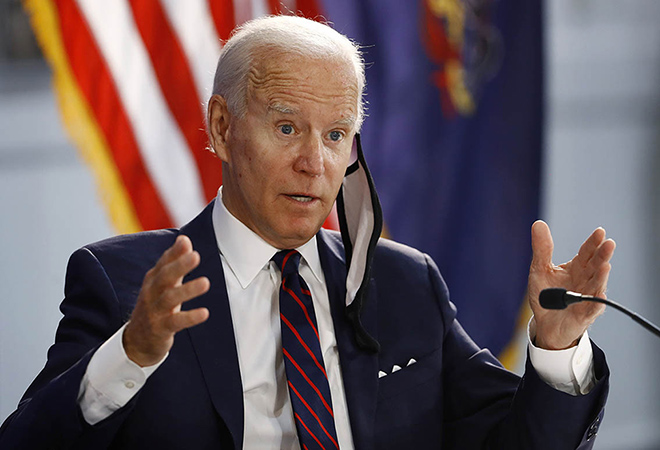
Democratic presidential nominee Joe Biden’s campaign recently released its “
Agenda for Muslim-American Communities”. In outlining their vision for the community, the document also highlighted Biden’s inclination to “champion human rights and democracy globally” with reference to the internment of
a million Uyghur Muslims, and
mass extermination of Rohingya Muslims. This even
included Biden’s call to the Indian government to “take all necessary steps to restore rights for all the people of Kashmir”, and noted the former vice president to have been “disappointed by the measures that the government of India has taken with the implementation and aftermath of the National Register of Citizens in Assam and the passage of the Citizenship Amendment Act into law.” It
deemed such measures to be “inconsistent with the country’s long tradition of secularism and with sustaining a multi-ethnic and multi-religious democracy.”
On being clubbed with the events in China and Myanmar, the criticism invited ire from Indian commentators (“
To appease the world's Islamists, Joe Biden snaps ties with truth on Kashmir, CAA, NRC”) and a group of Hindu Americans
even reached out to the Biden campaign to lodge their “resentment to the language used against India” and asked for “a similar policy paper on Hindu Americans.” Within days however,
news coverage in India turned to Biden’s
announcement of strengthening the US’ partnership with “natural partner” India as “a high priority” if he’s elected president, and his opposition to Trump’s suspension of H-1B visas which are the “
most sought-after by Indian IT professionals”.
Beyond this funambulism on courting the Muslim-American community and refraining from ‘rocking the boat’ on one of America’s most consequential bilateral relationships, the criticism is reflective of the progressives’ hold over the Biden campaign.
Rising currency of progressives
Over the past year, as US bipartisan support for India has come under strain,
analyses have emphasised on certain personalities for throwing a proverbial ner in the works. For instance, last year’s
Congressional hearing on human rights in the region, which turned out to be dominated by the situation in Kashmir, Rep. Ilhan Omar’s (D-MN-5) comments — bereft of any nuance over the
untoward role of cross-border militants in Kashmir, accrued the spotlight. Similarly, when Sen. Bernie Sanders (I-VT) addressed the Islamic Society of North America and said that he was “
deeply concerned about the situation in Kashmir”, analyses pointed to the undue influence of Sanders’ Pakistani-American campaign manager Faiz Shakir.
Beyond such influences however, bipartisanship on India is set to come under further strain on account of the rising currency of progressives in the Democratic Party.
With progressives recounting Democrats’ failure to deliver on the liberal agenda, the party’s ambivalence towards pursuing campaign finance reform, governance of big corporates, and comprehensive social security programmes have become major rallying points. Furthermore, with Trump’s 2016 takeover of the Republican Party via galvanising conservatives’ socio-cultural anxieties, the progressive faction’s own anti-establishment rhetoric grew into vilification of the Democrats’ post-Cold War foreign policy bipartisanship with Republicans on corporate-friendly immigration laws, anti-indigenous free trade agenda, etc. This schism within the Democratic Party was evident during the primaries, with moderates coming at odds with the progressives. While the former advocated for reclaiming the centre of the American political spectrum, the latter argued for a more progressive agenda centred on socio-economic populism. However, Biden — the most prominent establishment politician gunning for the nomination, pulled ahead of Sanders — the poster boy of the progressives, with massive wins on Super Tuesday (
winning 92 percent of the 1,344 delegates), mini-Super Tuesday (
winning five of the six states), and proved his capability to perform in
must-win states for Trump (like Arizona and Florida).
Despite these wins — indicative of the Democratic voter base’s evident inclination towards a moderate platform, the Biden campaign has sought conciliation with progressives. This seems to be aimed at
averting the resurgence of a 2016-style ‘Bernie or Bust’ movement, a group of progressive voters disgruntled with Hillary Clinton’s nomination either engaging in no-shows or opting to
vote for Trump instead. With some studies suggesting that nearly 12 percent of Sanders supporters “
crossed party lines” to vote for Trump, the brewing
#NeverBiden movement has spurred Biden’s campaign to join hands with Sanders to announce “
joint task forces” towards a unified platform which assimilates progressive policies. Wherein, it is expected that Biden’s foreign policy agenda would witness the most substantial shifts given his
little room for manoeuvre on ceding concessions on domestic issues like abolishing private insurance in the progressives’ call for ‘Medicare for All’.
Reformation over restoration
On foreign policy, Biden has run as a
restorationist who can reinstate America’s standing in the world. In criticising Trump’s abandonment of allies and initiation of trade wars, Biden has spoken of his vision as a matter of “
rescuing US foreign policy”. However, with Biden’s continued advocacy for American internationalism, progressives view him as a "
man of the past", given their preference for a restrained American outlook and greater emphasis on values in foreign policy.
On the former, as Trump alleged Biden to have been
weak on China, the former vice-president’s campaign briefly sought to out-hawk Trump in its approach before dialling it down. With their continued prodding for Biden to accept a more nuanced approach to China, progressives claimed credit. Sanders’ foreign policy advisor Matt Duss
said, “I think they
took those concerns and criticisms on board, and they understand a hawkish race to the bottom is unwise both politically and on policy.”
On the role of values, although Biden speaks of America’s role in moralistic terms (“The United States must lead not just with the example of power, but the power of our example”), progressives deem a mere restorationist foreign policy to hardly cut it. In addition, Biden’s track record (like his vote to authorise the Iraq War) and some nascent positions (like his refusal to condition US military aid to Israel to exact commitments for a Palestinian state) irk progressives.
The push for a greater role for values also stems from their abhorrence of Trump’s values-bereft ‘America First’ conduct of foreign policy, as they allege in case of his administration’s response to the Kashmir matter. And given Biden’s role in the cultivation of US-India bilateral ties — from his 2005 bipartisan legislation with Sen. Richard Lugar (R-IN) which led to India’s acquisition of its first US-built warship, to his role in setting the US$ 500 billion goal for US-India bilateral trade — the pressure to assimilate progressive views stands accentuated.
Case in-point being, the Biden campaign removed Amit Jani as its Muslim Outreach Coordinator early this year. The long-term Indian American Democratic operative had come under fire after multiple online petitions called for his ouster on account of alleged "Islamophobia" reflected in his family’s closeness to India’s Prime Minster Narendra Modi and the ruling BJP. In addition, although picked as the co-chair of the joint task force on healthcare policy, Rep. Pramila Jayapal (D-WA-07) — known for tabling the controversial House Resolution (H. Res. 745) on “urging the Republic of India to end the restrictions on communications and mass detentions in Jammu and Kashmir as swiftly as possible and preserve religious freedom for all residents”, has been accorded a prominent position in the campaign’s deliberation for a unified platform.
Hence, a ‘return to the past’ foreign policy won’t be guaranteed under Biden, and unbridled support for India could be a chief casualty of his political bargain with the progressives.
The views expressed above belong to the author(s). ORF research and analyses now available on Telegram! Click here to access our curated content — blogs, longforms and interviews.



 Democratic presidential nominee Joe Biden’s campaign recently released its “
Democratic presidential nominee Joe Biden’s campaign recently released its “ PREV
PREV


